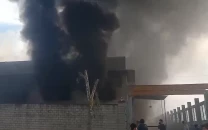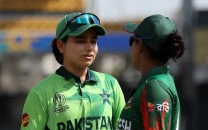CJP continues to defend PTI intra-party polls ruling
Legal experts criticise CJP's letter defending his ruling as review petition remains pending
1717497549-0/SIC-(1)1717497549-0-640x480.webp)
Despite a pending review petition, Chief Justice of Pakistan (CJP) Qazi Faez Isa continues to defend his January 13 ruling that deemed Pakistan Tehreek-e-Insaf's (PTI) intra-party elections unlawful, resulting in the party losing its election symbol in the recent general elections.
Responding to directives from CJP Isa, the Supreme Court Registrar dispatched a letter on May 3 to British High Commissioner Jane Marriott. This move was spurred by Marriott's remarks at the Asma Jahangir Conference, where she underscored the significance of democracy, elections, and the imperative of open societies.
“To ensure compliance with this democratic principle the law stipulates that if a political party does not hold intra-party elections, then it would not be eligible for an election symbol. A political party (which had itself voted in this law) did not hold the mandated intra-party elections. The Supreme Court reiterated what the law stipulated,” says the SC letter.
Despite the SC's stance, several legal experts have criticised the letter, given the pending review petition against the January 13 order. Presently, CJP Isa finds himself entangled in the case of the reserved seat, where he is compelled to clarify the misinterpretation of the January 13 order.
During Tuesday's hearing, CJP queried why PTI candidates hadn't requested the Election Commission of Pakistan (ECP) for the bat symbol. In response, Faisal Siddiqi, counsel for the Sunni Ittehad Council (SIC), suggested that this could be seen as contempt of court for violating the January 13 order. However, CJP Isa disagreed with Siddiqi and Justice Munib Akhtar.
When Justice Munib Akhtar pointed out that rubber-stamp errors were committed by ECP, CJP Isa reiterated that the crux of the matter lay in PTI's failure to conduct intra-party elections.
He emphasised that PTI had dodged intra-party elections even when its leader held the prime ministerial position, and instead of complying with the directive, they challenged it in various high courts.
Justice CJP Isa drove home the point that when it came to discussions about democracy, they ought to start with intra-party elections.
Justice Muhammad Ali Mazhar, a co-signatory of the January 13 order, reiterated that the bench had laid down the law: if there were any grievances regarding the non-allocation of reserved seats, the PTI could knock on the court's door again.
He reminded the counsel that the review petition was still pending and suggested that if there was a focus on the January 13 order, the review petition should also be heard along with this case.
‘Career-defining judgements’
A legal eagle noted that a single judgment can make or break a judge's career. Former CJP Munir, for instance, penned a book defending his decision to dissolve the first Sindh Assembly, which was given the nod by the Supreme Court.
Additionally, Justice Ejaz Afzal Khan, upon retirement, left behind a legacy of integrity within the bench. He authored the Supreme Court judgment that led to the disqualification of former PM Nawaz Sharif in the Panama case.
Some members of the bench raised eyebrows as to why the PTI, still a registered party, had not pursued the allocation of reserved seats through the ECP following the elections.
Observers note that it was evident that the PTI's legal team seemed to be dragging their feet in devising a post-election strategy. While some lawyers urged the PTI to approach the ECP for the allocation of reserved seats, the party remained hesitant.
Had the commission rejected their request, they could have taken the matter to the Supreme Court.
Advocate Abdul Moiz Jaferii, who was present during the courtroom proceedings in Courtroom No. 1, remarked that CJP Isa cautioned the counsel multiple times during the full court proceedings.
He noted that the CJP emphasised that the issues pertaining to the PTI and its associated decisions by the ECP were not on today's docket. Therefore, the court couldn't afford to waste its time analysing their shortcomings.
Later in the same hearing, he diverged onto a lengthy tangent, elaborating on the PTI's deficiencies, particularly its failure to conduct intra-party elections. He noted that had the PTI adhered to proper procedures, many of the issues wouldn't have arisen.
“This also had nothing to do with the issue the Supreme Court was hearing today and had everything to do with his own January 13 judgment which he was explaining the ratio of at length,” Jaferri added.


















COMMENTS
Comments are moderated and generally will be posted if they are on-topic and not abusive.
For more information, please see our Comments FAQ